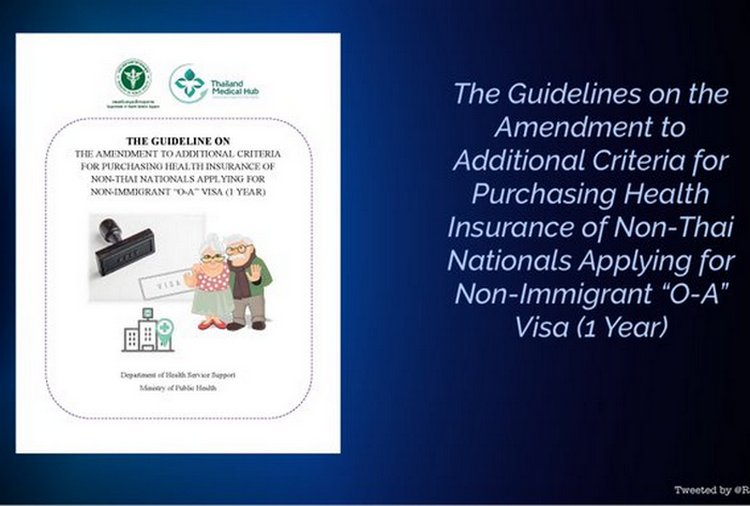
The Thai Ministry of Health has published the details of the October 1 changes to the O/A annual retirement option which raises the level of compulsory hospital inpatient insurance from 400,000 baht to three million baht, or US$100,000. They apply both to new applications at Thai embassies abroad and to annual extensions at Thai immigration offices. The minimum age remains 50 years.
The insurance must cover all medical eventualities, including but not restricted to Covid, whilst both foreign and Thai-based insurance companies are eligible to provide cover. Under the expiring regulations, foreign insurance may be used only for the initial application at a Thai embassy and not for the subsequent extensions of stay.
For the first time in Thai immigration history, applicants for the O/A visa or extension who are unable to obtain comprehensive medical insurance because of old age, infirmity or pre-existing conditions will be able to self-insure. They will be required to show at least three million baht of assets which can include cash in a Thai or foreign bank, ownership of property or similar funds. Alternatively, they can show evidence that their hospital bills in Thailand will be paid for by the home country of the applicant. This could benefit, for example, retirees from the US military who are often given worldwide health cover.
However, the Ministry of Health memorandum makes it clear that any claims of wealth abroad, or insurance issued by foreign-based companies, will require confirmation by the Thai authorities including Thai embassies abroad or the Ministry of Foreign Affairs in Bangkok. In other words, applicants can expect a complex paper chase. The insurance requirements, of course, are on top of the 800,000 baht held in a Thai bank, or proof of regular monthly payments, which are part of the current requirements.
Immigration consultants are already saying that wealthy O/A retirees in Thailand, who cannot obtain insurance, would be well-advised to keep and retain 3,800,000 baht on deposit here. That’s the simplest way to prove the new baseline. The alternative appears to require several affidavits, forms for companies and banks to sign as well as approval from Ministry of Foreign Affairs officials.
It should be noted that the October 1 revisions apply only to the O/A visa and annual extensions. Retirees living here with alternative permissions – for example the Elite visa, non-immigrant “O” extensions of stay based on marriage or retirement – are not mentioned in the Ministry announcement.
It is not easy to change the initial O/A visa to the less onerous O, once granted by the Thai embassy abroad. The procedure requires the pensioner to leave the country and enter again with, say, a 60 days tourist visa which can then be converted to three-months O at Thai immigration plus the 12 months extension. Then you are in the clear. For now anyway.
 |
 |
 |




